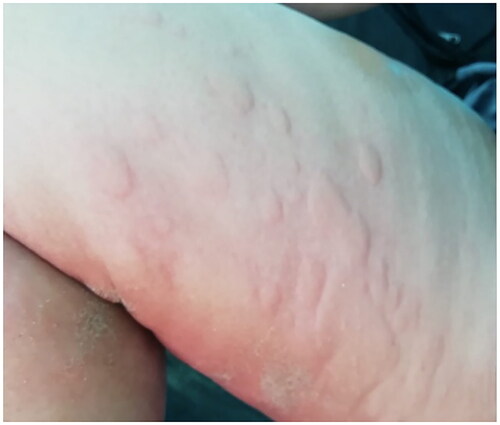Cold urticaria (CU) is a common subtype of chronic inducible urticaria, characterized by the development of pruritic wheals and/or angioedema, in response to cold exposure (Citation1, Citation2). Systemic reactions can occur in case of extensive cold contact, such as dyspnea, digestive manifestations, dizziness or disorientation and, in severe cases, hypotension with cardiovascular collapse (Citation3). Swimming in cold water is the most common trigger of severe reactions, leading to a risk of drowning. Although CU is mostly idiopathic, it may also be secondary to an underlying cause (cryoglobulinemia, infectious disease or drug exposure). Diagnosis is made using cold stimulation tests such as the ice cube test.
Second-generation H1 antihistamines, at regular and up to fourfold dosage are the first line treatments of CU (Citation4). Patients should be advised to avoid cold temperature exposure and aquatic activities. In refractory forms, omalizumab may represent an efficient alternative (Citation5).
We report the case of a patient with refractory CU successfully treated with dupilumab after failure of standard treatment, including high doses of omalizumab.
A 38-year-old woman was referred to our Dermatology department with refractory CU, evolving since the age of 12. She had nor specific medical history neither any atopic comorbidity and was not taking any medication. There was no familial history of CU. The first episode occurred after swimming in lake water, resulting in generalized urticaria, dizziness and syncope with temporary loss of consciousness. Thereafter, she experienced recurrent episodes of extensive urticaria, angioedema and severe dizziness after exposure to cold (). CU increased during the winter period with a significant impact on her quality of life. The ice cube provocation test was positive. Laboratory investigations, including autoimmune evaluation, did not show any abnormality. Lack of therapeutic response with desloratadine 5 mg up to four times daily led to the initiation of omalizumab 300 mg monthly for 6 months secondarily increased to 300 mg every 2 weeks for another 6 months. Her symptoms remained uncontrolled. Thus, dupilumab was started, with a loading dose of 600 mg followed by 300 mg every 2 weeks. She reported a rapid complete disappearance of her symptoms, without any flare-up during cold exposure. At the last follow-up, 18 months after dupilumab initiation, she was still in complete remission and did not report any side effect.
The physiopathology of CU remains largely unknown. It has been demonstrated that mast cells activation and degranulation play a central role, leading to production of histamine and other inflammatory mediators (Citation6). Autoimmunity was suggested to be involved, with IgE-mediated reaction to cold-dependent skin antigens (type I autoimmunity), or with IgG or IgM autoantibodies that activate mast cells by binding to IgE or its high-affinity receptor FcεRI (Citation1). Th2 cytokines IL-4 and IL-13 may also play a role, by increasing IgE receptor expression on mast cells, and by driving B-cell immunoglobulin class switching to IgE and IgG isotypes (Citation7).
Dupilumab is a fully human monoclonal antibody that inhibits the IL-4 and IL-13 signaling pathways through blockade of IL-4 receptor α subunit. It is currently used for the treatment of moderate-to-severe atopic dermatitis.
To our knowledge, only one case report of CU successfully treated with dupilumab was previously published (Citation8). The described patient had CU and severe atopic dermatitis. Both diseases were significantly improved after one month of dupilumab, with negativization of the ice cube test. Several case reports have also supported the efficacy of dupilumab in chronic spontaneous urticaria resistant to omalizumab (Citation9). Our case suggests that the inhibition of the IL-4 and IL-13-related pathways could be an effective strategy for the management of refractory CU even in patients without an associated atopic dermatitis. Controlled studies are required to validate dupilumab in this indication.
Ethical approval
The patient in this manuscript has given written informed consent to publication of her case details.
Disclosure statement
Ziad Reguiai received honoraria from Sanofi and Novartis as a speaker, advisor and investigator in clinical trials.
Data availability statement
The data that support the findings of this study are available from the corresponding author, Z. Reguiai, upon reasonable request.
Additional information
Funding
References
- Maltseva N, Borzova E, Fomina D, COLD-CE Steering Committee, et al. Cold urticaria – what we know and what we do not know. Allergy. 2021;76(4):1077–1094.
- Młynek A, Magerl M, Siebenhaar F, et al. Results and relevance of critical temperature threshold testing in patients with acquired cold urticaria. Br J Dermatol. 2010;162:198–200.
- Neittaanmäki H. Cold urticaria: clinical findings in 220 patients. J Am Acad Dermatol. 1985;13(4):636–644.
- Magerl M, Altrichter S, Borzova E, et al. The definition, diagnostic testing, and management of chronic inducible urticarias - The EAACI/GA(2) LEN/EDF/UNEV consensus recommendations 2016 update and revision. Allergy. 2016;71(6):780–802.
- Metz M, Schütz A, Weller K, et al. Omalizumab is effective in cold urticaria—results of a randomized placebo-controlled trial. J Allergy Clin Immunol. 2017;140(3):864–867.e5.
- Kaplan AP, Garofalo J, Sigler R, et al. Idiopathic cold urticaria: in vitro demonstration of histamine release upon challenge of skin biopsies. N Engl J Med. 1981;305(18):1074–1077.
- Poulsen LK, Hummelshoj L. Triggers of IgE class switching and allergy development. Ann Med. 2007;39(6):440–456.
- Ferrucci S, Benzecry V, Berti E, et al. Rapid disappearance of both severe atopic dermatitis and cold urticaria following dupilumab treatment. Clin Exp Dermatol. 2020;45(3):345–346.
- Lee JK, Simpson RS. Dupilumab as a novel therapy for difficult to treat chronic spontaneous urticaria. J Allergy Clin Immunol Pract. 2019;7(5):1659–1661.e1.


